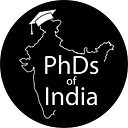Synaptic connection
“I’ve always nurtured a deep curiosity about the world around me. I vividly remember the thrill of observing onion peel cells under a microscope in high school. Although I had a brief interest in astrophysics, my passion for biology ultimately guided my career path.
My decision to pursue higher studies was supported by my parents, despite some relatives suggesting more lucrative career options like an MBA. Their support reinforced my commitment to science and academia. After completing my Master’s from North Bengal University in Darjeeling where I had my first exposure to research, I worked as a project assistant at CSIR IGIB for 6 months before moving to IISER Mohali, where I initially joined as a Junior Research Fellow (JRF). I later qualified NET and transitioned to a PhD program in 2014.
My PhD work, under the guidance of Prof. Kavita Babu, focused on synaptic functions of cell adhesion molecules in C.elegans. Despite initial setbacks, such as having to abandon a project on a potential cell adhesion molecule and facing challenges with microinjections and imaging experiments, my supervisor’s unwavering support was invaluable. Her encouragement and constructive feedback were crucial, especially during times of failure.
I took the national entrance test twice after joining IISER Mohali, and although failing the first time was disheartening, securing an AIR of 34 in the CSIR-NET was a personal milestone. Despite that, self-doubt plagued my mind quite often but my supervisor’s faith in my abilities kept me motivated. Her reaction to my successes, such as my first successful cloning experiment, was profoundly rewarding.
Throughout my PhD, the camaraderie in our laboratory, known as the “chai-wali” laboratory for our twice-daily tea breaks, provided a supportive and balanced work environment.
However, I do recognize the need for improvements in the Indian PhD system. Students are often under-compensated for their efforts, and smaller institutes lack adequate funding. There is also a need for better feedback and rotation systems to prevent abuses of power by supervisors. A tragic incident involving a friend at IISER Mohali, whose PhD was intentionally delayed by her supervisor, highlights the urgent need for regulatory bodies to intervene in conflicts between students and supervisors. The system must ensure funding and support throughout extended PhD durations and implementing these fundamental changes could significantly improve the academic experience for future PhD students in India.”
-Vina Tikiyani, PhD in Neuroscience, Indian Institute of Science Education and Research, Mohali
Interviewed and written by Aniruddha Mukherjee
